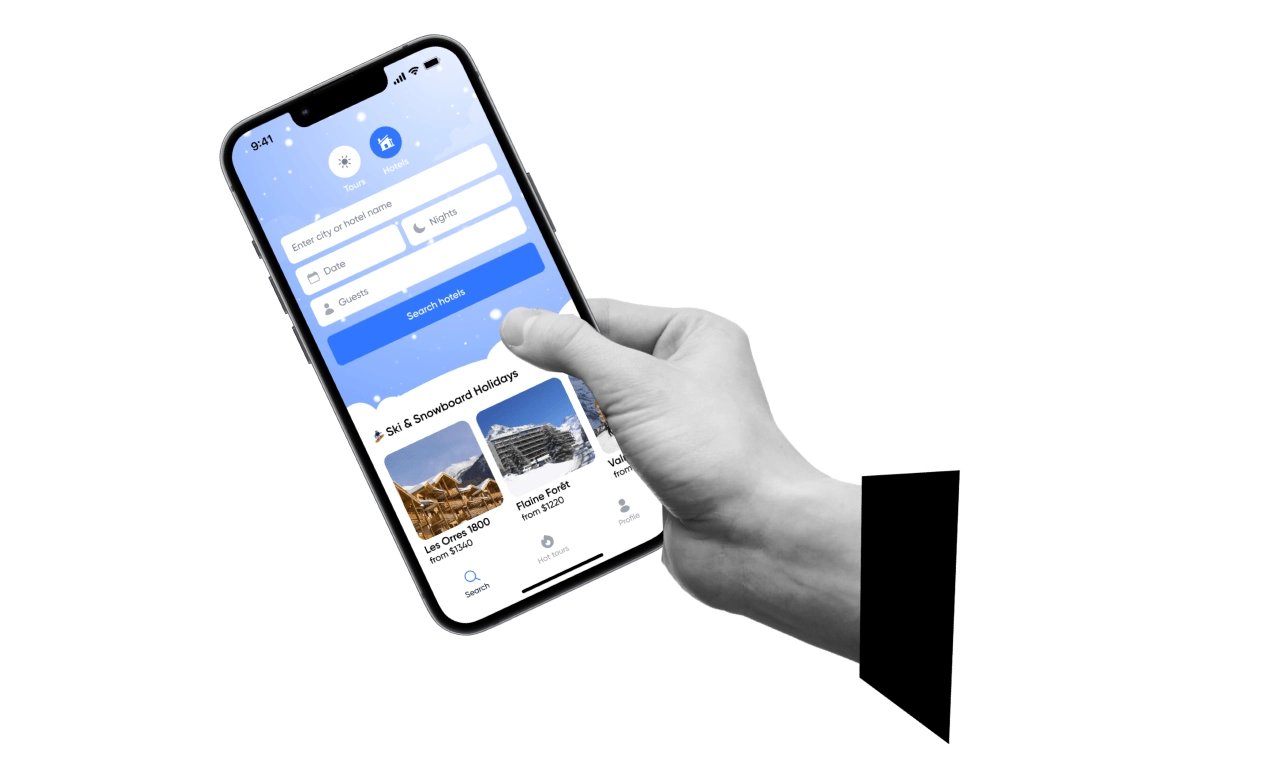Top 14 tourism and travel technology trends for 2025
Alex Ragin
Updated Jan 19, 2025 • 9 min read

In this article
The travel industry is going through a tech transformation. Changes are happening across all stages of the travel experience: from how security checks are conducted, to how we plan our trips, and how we check in to hotels, to the transport we take to reach our destinations. Let’s look at the latest technological trends, like AI and biometrics, and see how tech is shaping the future of tourism.
Top 14 technology trends in the travel industry
Automation
The pandemic had a huge impact on travel companies who were met with unprecedented global travel restrictions. It forced them to find new ways to automate their processes – not just to continue operating remotely but to cut their expenses and save on staff costs too.
Travel companies are now recovering from the hit, but automation is firmly here to stay. Some examples include email automation and e-signing for travel forms and documents. Automation allows companies to be able to operate in any sort of conditions and also save on resources.
Artificial intelligence
The travel industry has witnessed the rapid growth of artificial intelligence (AI) applications that aim to enhance customer experience, optimize operational efficiency, and increase the profitability of travel businesses.
One of the most prominent applications of AI is for online itineraries like Roam Around. These tools can provide customers with personalized travel plans that are generated by AI based on the traveler's preferences. While the implementation might not be perfect at the moment, these tools have the potential to help travelers save time and money by finding the best options for their trips.
Another important AI use is for dynamic pricing. This can help travel businesses maximize their profits by offering the right price to the right customer at the right time. Dynamic pricing can also benefit travelers by providing them with more choices, flexibility, and transparency in their travel decisions.

Chatbots
In the past, chatbots were substitutes for human assistants, capable of only answering general questions. But with the development of natural language processing and generative AI they can now provide personalized and convenient services to travelers, such as booking flights, hotels, tours, car rentals and more. AI chatbots can also offer real-time information based on a traveler's preferences, location and context.
Chatbots are also beneficial for travel providers. Advanced chatbots can reduce operational costs, increase customer satisfaction and loyalty, improve efficiency and productivity, and enhance brand image and reputation. They can also help collect valuable data about customer behavior, which can be used to optimize marketing strategies, product offerings and customer service.
For example, Expedia customers can now chat with AI in their app and get recommendations on destinations, accommodation, and so on. According to Expedia, the AI also remembers and saves discussed hotels, helps customers to stay organized, and eases the process of choosing dates and checking availability.
Mobile apps
According to Statista’s latest information, global revenue from travel apps is going to increase up to 60% in the next four years. Apps hold a firm position on the list of mobile trends for the future in the travel and tourism industry. It comes as no surprise — many well-known travel companies like Airbnb and Expedia continue to invest heavily in their travel application development, and other companies are now following suit.
Mobile apps suit travelers’ needs simply by definition — they are simple and personalized tools that are always in their pockets. Apps allow travelers to access travel information and services at all times, often without internet connection. They also allow for a customized experience by providing filters, preferences and location-based services.
Thinking of developing a mobile app for your travel company?
There’s a lot to learn before you start. Book a call with our friendly team for guidance and expertise.

Bringing travelers together
One of the newest trends in the travel and tourism industry is the focus on bringing travelers together and providing tools to socialize.
The new trend involves merging travel tools with social media instruments, like Hostelworld’s networking platform called The Solo System. The idea behind this one is to give solo travelers a chat option so they can connect with their future hostel neighbors and other travelers in the city. The company’s internal research showed that 76% of travelers find “meeting people” their top deciding factor when booking a hostel, and 77% like to pair up with other travelers to do activities.
Personalization
Speaking of solo travelers, they also come into the next on our list of travel technology trends: personalization.
Solo travelers seek experiences that are specifically tailored to them and in order to cater, some travel companies are using data and machine learning to generate personalized recommendations. They collect all the important info that their customer provides, analyze it, and then come back with recommendations, saving the customer time and making them feel valued and understood.
Internet of Things
The Internet of Things (IoT) is a technology that connects various devices to the internet, enabling data collection, analysis and communication. As our travel experiences become more and more digitized, it’s no wonder that IoT now features on the list of top tech trends in the travel industry.
There are multiple ways IoT can be implemented. For example, IoT-enabled luggage can be tracked using geolocation tags, allowing travelers to locate their bags easily at any time. Many hotels are now using smart room lockers that allow keyless entry with an access code sent to the customer’s smartphone. The same tools can be used to conduct check-ins and check-outs without the need for receptionists.
IoT can also enable travel companies to monitor and manage their assets, resources and processes more efficiently, such as energy consumption, inventory levels, maintenance schedules and staff performance.
Sustainability
Nowadays, travel businesses are under a lens when it comes to sustainability, expected to minimize their carbon footprint, water consumption and biodiversity impact as much as possible. To do this effectively, they need reliable data and systems that can track and integrate metrics across their operations and supply chains. That’s where digital solutions like eco-friendly and carbon footprint calculators come in.
Biometrics
You’ve probably come across biometrics in day-to-day life, but it has its uses in the travel industry too. Biometrics involve the use of physical or behavioral characteristics to identify and authenticate individuals. As a travel innovation tool, biometric systems involving facial and iris recognition can be used in airports and at hotel check-in points. This can speed up the security process and allow customers to access their rooms without queuing at a reception desk.
According to Amadeus’ Travel Trends 2023, biometric payments are now mainstream in the travel industry and are reducing the need for cash or cards, while increasing the efficiency and safety of transactions.
NFTs
While the whole NFT trend has died down and doesn’t seem likely to return, it’s worth mentioning that some travel companies are still trying to implement them into their business models.

One of the latest examples is airBaltic’s Planies NFT — a collection of various cartoon-ish plane images. Obtaining one grants various bonuses: company points, business class upgrades, and so on.
Due to its current low popularity, relying on NFTs doesn’t seem to be a good long-term strategy. It’s unlikely they’ll have much of a place in the travel industry future, but, as airBaltic shows, there are still ways to use the technology to engage and entice customers.
Augmented reality
AR is one of the most exciting tourism technology trends right now. It’s enhancing travel planning by allowing users to explore destinations, hotels, and attractions virtually and enjoy immersive previews of their potential travel experiences. At the same time, AR is enriching on-site experiences by overlaying digital information onto real-world scenes and giving travelers access to interactive guides, historical information, and navigation assistance.
AR also offers innovative ways for travel businesses to engage with customers through interactive marketing campaigns. There’s so much potential.
Voice recognition
Voice recognition is one of our favorite emerging technologies in the travel industry. It provides travelers with convenient access to information and services and enables hands-free interactions. With simple voice commands, travelers can inquire about travel details, make reservations, and receive real-time updates. This is great for making services accessible for people with visual impairments.
When combined with AI, voice recognition systems can provide personalized recommendations and tailored assistance, enhancing the level of service and allowing for more customized travel experiences. Voice recognition technology can also streamline customer service processes by automating routine inquiries and providing instant responses to common questions. It can even offer translation services, contributing to a more seamless travel experience.
User-generated content
User-generated content is one of the most important technology trends in tourism due to its transformative impact on how travelers research, plan, and make decisions about their trips. Customers today rely heavily on insights and experiences shared by fellow travelers, which offer a more genuine perspective compared to traditional promotional content. Shared reviews, recommendations, photos, and videos play a significant role in influencing travel choices and shaping expectations, and also foster a sense of community and trust among travelers.
Modern travel businesses can leverage user-generated content to enhance their marketing strategies, build brand credibility, and engage with their audience in a more authentic and relatable way. In summary, user-generated content is pivotal in today’s travel landscape and is certainly here to stay.
Contactless payments
We have to mention contactless payments as one of the top business travel technology trends, because of how crucial they are in transforming the experience for travelers. Emerging from the need for extra safety during COVID-19, contactless payments have now become a standard practice in the industry.
Allowing travelers to make payments using their mobile devices, wearables, or contactless cards enhances convenience and caters to the preferences of modern travelers who value speed, ease, and security in their financial transactions. It also boosts efficiency for businesses, especially in high-traffic travel environments such as airports, hotels, and tourist attractions. Embracing contactless payment methods positions travel businesses to meet evolving traveler expectations and adapt to the digital transformation of the payment landscape.
Conclusion
The travel industry is going through a digital transformation. New travel industry trends include automation, biometric security, AI chatbots, social media integrations and personalized recommendations. Digital tourism technologies offer huge benefits to both customers and businesses, including more efficient use of resources, opportunities for engagement, and improved customer satisfaction.
Understanding travel tech trends is crucial for travel businesses wanting to stay ahead and prepare for what’s to come. We’re certainly excited about the future of technology in travel!
Related articles
Alex loves travel and tech and founded Zoftify to help travel companies use technology more effectively. Before this, he worked in tech consulting, where he led international mobile development teams.
4.94 (33)